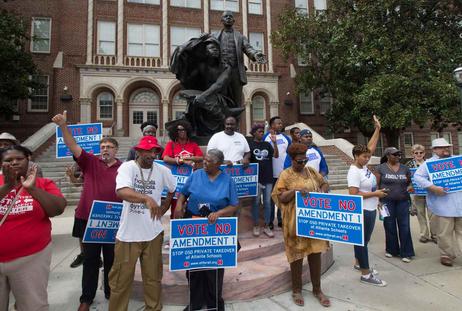As Louisiana Governor Jindal Fights to Reform Louisiana Schools, Teachers Push Back
Louisiana Governor Bobby Jindal has taken his sweeping education reform to state lawmakers, while educators in the state who are more than a little unhappy with Jindal’s proposals are finding ways to push back. Jindal’s plans would usher in some of the most significant education reforms in the country, with Jindal tackling sticky issues like teacher tenure and retirement plans, charter schools, and a voucher program that would impact half the children in the state. While Jindal’s proposals are garnering support from many state lawmakers and residents, others are downright furious with Jindal’s ideas on how to transform the state’s education system.
Teacher Tenure Tied to Job Performance
One of Jindal’s proposals that has won the ire of local teachers’ unions involves how teachers are hired and granted tenure. According to the Daily Comet, the bill would shift hiring new teachers to principals and superintendents rather than school boards. The bill would also make significant changes to current teacher tenure procedures, which are tied to annual evaluations for three years. Current evaluations rank teachers as either satisfactory or unsatisfactory, which makes it challenging to weed ineffective teachers out from the rest.
Under Jindal’s new tenure proposal, teachers would be subject to annual five-year reviews under a more complex rating system. Teachers who received “highly effective” ratings for five years straight would be eligible for tenure. “Ineffective” ratings would result in loss of tenure protections. Teachers would also lose seniority protections during times when schools were faced with layoffs, allowing schools to choose the most effective teachers to retain rather than those who had been in the system longest.
“We need to give districts more flexibility to remove ineffective teachers from the classroom,” Jindal was reported saying in the Daily Comet.
This archival video from NPR explains one aspect of the issue.
Vouchers for Students in Failing Schools
Another controversial portion of Jindal’s bill is the voucher program that would impact around half of all Louisiana’s children. According to Jindal’s proposal, students currently enrolled in public schools receiving a “C” or “D” rating would be eligible to attend a private or parochial school at the taxpayers’ expense. In New Orleans, students in failing schools would be eligible for the voucher program as well.
The Town Talk reports that proponents of the bill see the voucher system as a way to get students out of a school system that is currently failing them. Opponents argue that vouchers will take tax dollars away from public schools that are already struggling to educate children properly. They have also expressed concern that with a limited number of spaces available in the state’s private schools, few students would actually be served by the program.
Failing Schools Warrant Radical Reform, Jindal Says
Jindal defended his proposals at MSNBC, stating, “The reality is that action is needed now. Forty-four percent of Louisiana’s public schools received a grade of D or F last year. Louisiana’s fourth and eighth-graders ranked among the bottom in English and math when compared to other states. In 2010, 230,000 students in Louisiana were below grade level – one-third of all students in public school.”
Recently, Jindal’s office released a press release that listed more than 100 local elected officials who supported his proposals. State lawmakers also like many of Jindal’s ideas – the House Education Committee recently approved the 46-page bill by a vote of 12-6, according to the Town Talk. The Senate Education Committee also approved the bill, voting 6-1 on tenure and 5-1 on vouchers.
This archival video explains Governor Jindal's position.
Bill Proponents Want Better Education for Louisiana Kids
Those who support Jindal’s proposals believe radical changes are required if Louisiana’s kids are to receive a higher level of education than what is currently available. During committee debate, many Louisiana residents, parents, and educators convened to let state lawmakers know what they thought of the proposed reform. Greg Davis of Lafayette told the committee he was testifying on behalf of students in Lafayette Parish. Parish was reported in the Town Talk that choice was necessary to rescue children from “chronic and sustained failure.”
Davis referred to another bill component that allows parents to vote on whether the Recovery School District should be able to take over failing schools and run them. He cited one recent situation where a school board allowed a school to close down rather than putting it under the jurisdiction of the RSD.
Sister Carol Shively, the superintendent of Catholic schools in Shreveport, told the panel that families frequently make financial sacrifices to send their children to private school “even though they pay taxes to educate other people’s children.”
Jindal Goes Toe-to-Toe with Teachers and Unions
Some of the most vocal opponents of Jindal’s bill are the teachers and unions within the state. According to a report at The Weekly Standard, the most prominent teachers’ union in Louisiana, the Louisiana Federation of Teachers, has targeted the governor’s proposals on its home page. The organization has also started a petition to “tell Governor Jindal he is wrong about teachers and public schools!”
Teachers across the state recently walked out of their classrooms and converged on the state capitol to let the governor and Louisiana lawmakers know they were unhappy with the bill. At least four school districts, including Baker, St. Martin, Vermilion, and East Baton Rouge, had to cancel classes for the day because of teacher protests, MSNBC reported.
Steve Monaghan, president of the Louisiana Federation of Teachers, told MSNBC, “The governor lit this fuse. The governor chose to run his bills this week, not us.”
Questions? Contact us on Facebook and Instagram. @publicschoolreview












